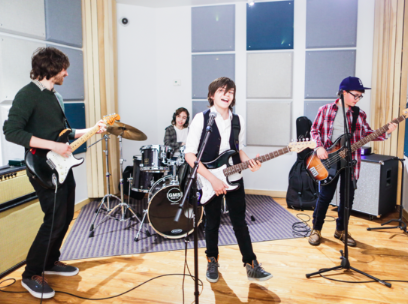 Here at Replay, we think that there’s no better time to start a band than when you’re big enough to hold a guitar or have your feet reach the pedals on a bass drum. That’s why we have Discovering Rock, an immersive experience playing in a rock group for kids 8-11 years old. For Jana, a 10-year-old classically trained pianist who now plays keys in The Vibe, joining Discovering Rock was a no-brainer. “I wanted to play something other than classical music and this was just an opportunity to make more friends and have fun,” she says. For 9-year-old Ryan, guitarist and vocalist for Ms. Fitz, wanting to be in a band was much simpler: “I think it’s fun to make noise!”
Here at Replay, we think that there’s no better time to start a band than when you’re big enough to hold a guitar or have your feet reach the pedals on a bass drum. That’s why we have Discovering Rock, an immersive experience playing in a rock group for kids 8-11 years old. For Jana, a 10-year-old classically trained pianist who now plays keys in The Vibe, joining Discovering Rock was a no-brainer. “I wanted to play something other than classical music and this was just an opportunity to make more friends and have fun,” she says. For 9-year-old Ryan, guitarist and vocalist for Ms. Fitz, wanting to be in a band was much simpler: “I think it’s fun to make noise!”
While most of the Discovering Rock students insist that Replay is more fun than school, research has also shown that playing music has had a positive effect on students both academically and socially. For Jana from The Vibe, Replay provides a much-needed break from the drudgery of going to school everyday. “I have something to look forward to on Thursdays. School is a hole,” she says, “and then you get a ladder and crawl up and Replay is all the way up in space.” But she asserts that her time at Replay has helped her “build teamwork and responsibility.” Her bandmate and close friend Evan (drummer for The Vibe) adds that being in a band “is like a quilt, and it allows us to knit through our problems.”
“Speaking as a therapist, a father and a spouse, I’ve become familiar with many different types of relationships. None is more unique or complex than being in a band,” asserts Replay founder and clinical social worker John Rubin, a drummer who understands all too well how being in rock band is the sort of social experience that requires the ability to compromise, empathize and, most importantly, listen. And like a marriage, being in a band can ultimately result in some of the closest, most profound, and most rewarding bonds of a person’s lifetime. One might even argue that everyone should have to be in a band in order to learn vital social and problem-solving skills, and make the kind of friends that you will keep forever.
From their first Discovering Rock session, kids are encouraged to follow their specific musical tastes and passions, and they are able to learn at their own pace. They get to play the instrument they want to play and bands are formed organically around the styles of music the kids like. And the bands are kept small (usually 3-4 in a group) so that they get a lot of individualized attention and get to play all of the time.
Everyone starts by learning cover songs, but original songwriting is encouraged very early on in the curriculum as well. And while Discovering Rock students are taught the fundamentals of music theory and solid technique, Replay band coaches strive to teach kids to love music, believe in themselves and to feel enthusiasm for playing their instruments. “If a kid wants to be an amazing musical technician, that’s great and they’ll learn that,” says Rubin, “But what is most important is what our students feel in their heads and in their hearts. We are in the business of building confident, expressive musicians.” Replay band coach Alex Goldberg adds, “A fundamental part of the program is keeping the kids writing original material regardless of how good of a player they are.”
By the end of the season in Discovering Rock, every band gets the chance to get up on stage at a genuine New York City club and play in a showcase for their parents, teachers, fellow Replay students and friends. A large number of these bands elect to play their own original material [maybe link to a video of a band playing an original song here?] and the results are always amazing. According to Goldberg, “The showcases are a vital part of the curriculum. The kids learn that playing in a venue is different than playing in a studio. And even when someone gets stage fright or a performance doesn’t go perfectly, no one is ever scared off from playing.”
The ability to keep playing even in the face of fear, mistakes or any other adversity is a life skill that can translate to social and academic situations and can benefit any child. “When you are in a band and taking creative risks in front of your peers, it can put you in a very vulnerable place,” Rubin says. “We have seen kids go through the process of songwriting and performance with a strong feeling of empowerment and achievement. The skills that are developed while navigating this experience are incredibly useful and can be applied to how one develops in and out of the rehearsal studio.”

